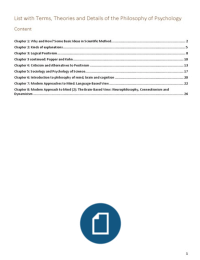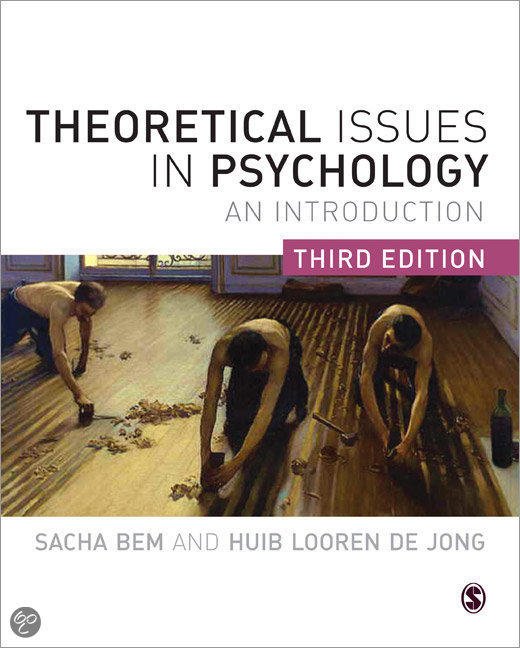List with Terms, Theories and Details of the Philosophy of Psychology
Content
Chapter 1: Why and How? Some Basic Ideas in Scientific Method ................................................................................ 2
Chapter 2: Kinds of explanations .................................................................................................................................... 5
Chapter 3: Logical Positivism .......................................................................................................................................... 8
Chapter 3 continued: Popper and Kuhn ....................................................................................................................... 10
Chapter 4: Criticism and Alternatives to Positivism ..................................................................................................... 13
Chapter 5: Sociology and Psychology of Science .......................................................................................................... 17
Chapter 6: Introduction to philosophy of mind, brain and cognition .......................................................................... 20
Chapter 7: Modern Approaches to Mind: Language-Based View ................................................................................ 22
Chapter 8: Modern Approach to Mind (2): The Brain-Based View: Neurophilosophy, Connectionism and
Dynamicism .................................................................................................................................................................. 26
1
, Term Explanation Explanation 2
Chapter 1: Why and How? Some Basic Ideas in Scientific Method
Epistemology Philosophers that evaluate the claims of knowledge
Demarcating science objectivity, rationality and truth are the most important factors in science
Unification and
explaining and predicting by reducing theories
underlying causes
keep an open mind criticism, open-mindedness - reject idea of universal criteria for rationality
Realism Knowledge picture of objective world
Truth correspondence between knowledge and world
Problem: God's eye-view: no possibility to get out of theory-view and access world
directly (just god?)
Pragmatic Realism Putnam: world and mind make up the world and the mind together
Correspondence Facts/ theory corresponds with nature
criterion of mind, subjective, not necessarily corresponding to
Idealism Knowledge
outside world, world constructed by knowing-subject
Truth coherence (consistent with rest of knowledge)
Coherence theories are true if they are consistent with the rest of our knowledge
knowledge is subjective: every group, subject, period, class has ist
Relativism Truth
own truth
more collectivistic and social determinants of ideas
Knowledge human construction, reflection of social interaction
Impossibility of
realism is epistemological literal sense impossible
"objective" knowledge
convergent realism new findings fit in theory and extends theory -> form new theory (converge)
Pragmatism (best interactive activity, in between of realism and idealism, revealing reality by acting on it
explanation) -> interaction of subjectivity and objectivity
instrument, functional and interactive, coping with world - value-
Knowledge
laden and adaptive (evolution)
Truth success in theory and experiment
Manifest vs. scientific
manifest image common-sense knowledge, it’s real, how you see it
image (Sellar)
scientific image science describes what's really real
both are real on a continuum
stereoscopic
science is not finished yet -> might progress and recreate
vision
Characteristics of scientific knowledge
applicable across the board, theory coherent and hierarchical, no ad
Systematicity
hoc explanations, unification: same laws everywhere
Well-defined
specify methods as legitimate subject matter, facts and explananda
methods
descriptive level: ignoring certain aspects of reality; explanatory
Reduction level: reducing phenomena to underlying principles -> everything
reducible to physics -> "nothing-but"
Objectivity controllable, reliable, intersubjective
Clarity statements are not ambiguously -> addresses to public domain
Revisable knowledge is always open, never definitive
Science vs. Common- matter of degree not principle -> science open, organized systematic, general,
sense methodical
Reduction is most distinguishing feature of science
2






